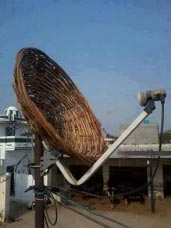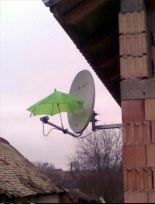Just Dishing Out a Story
Maintaining signal receiving sites can be a challenge, for many reasons.
For example, the signal received by satellite dishes is very tiny. While the use of parabolic dishes can achieve some significant gain figures, it also means proper alignment of the dish and the LNB is critical to solid reception. For that reason, the use of a “dish finder” and/or spectrum analyzer is normally required for peak alignment.
Maintaining a clean, good received signal has its own challenges, especially during “sun fade” (twice a year the sun will be found in alignment with the dish, and “natural noise” overwhelms the transmitted signals.
In some locations, lawnmower engines have been known to “jam” a satellite dish.
High winds and major storms can easily “turn” a loose dish, warp it, or hit it with a lightning bolt. Another physical danger to a dish might come from a car or truck that evades traffic control devices (poles, concrete blocks, fences) to “bump” the dish.
And then there is heavy precipitation, from rain or snowstorms, that can cause signal fade, either by absorbing the signal, or changing the physical structure of the dish and the LNB focal point. During some seasons, it becomes the engineer’s duty to go out and sweep the dish (unless, of course, he can talk an intern into the job!) to keep signal deterioration from killing the program audio or video.
 In fact, sometimes, after a storm has passed, the engineer will go out to check on the condition of the dish and, occasionally reports back that “the storm has left it as a basket case.”
In fact, sometimes, after a storm has passed, the engineer will go out to check on the condition of the dish and, occasionally reports back that “the storm has left it as a basket case.”
Yes, there is a lot that can affect satellite reception.
For that reason, it is common for engineers to exchange stories about how they get the snow out of the dish, remove wasps from the LNB, or otherwise mitigate issues with local interference, etc.
 And, when visiting another’s site, it is time to take a quick look at their dishes is warranted – who has the biggest dish?? (!), mounting dishes at acute angles to the horizon, or some unusual scheme to protect the dish and LNB.
And, when visiting another’s site, it is time to take a quick look at their dishes is warranted – who has the biggest dish?? (!), mounting dishes at acute angles to the horizon, or some unusual scheme to protect the dish and LNB.
So, as you consider your dishes, perhaps you have a story to dish? Let us know!
